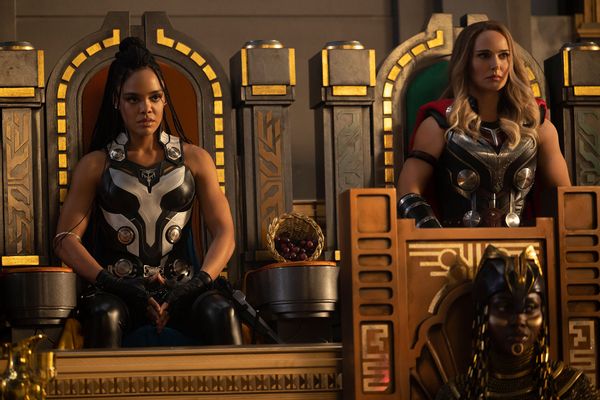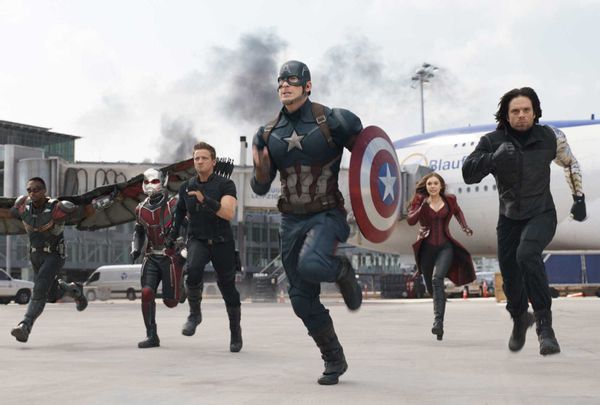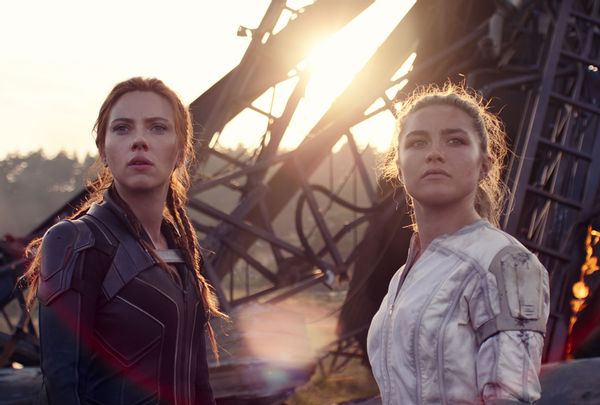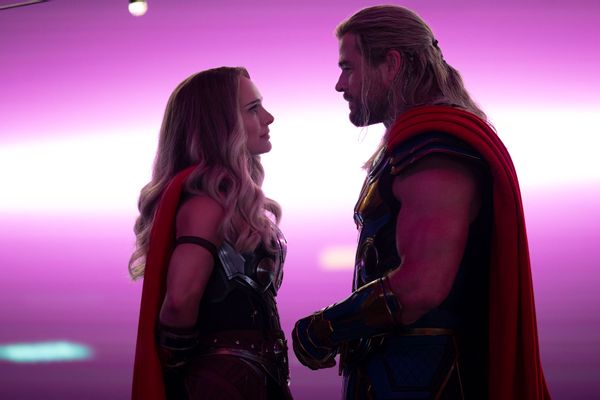
It would seem that the greatest crime "Thor: Love and Thunder" commits is not being enough of . . . something.
The story doesn't hold enough gravitas to show Thor (Chris Hemsworth) in his best light. Christian Bale's villain, Gorr the God Butcher, doesn't receive enough screentime to overcome the tsunami of jokes. The script doesn't grant Tessa Thompson's Valkyrie enough space to find the romance that was teased in the lead-up to the movie's release. It falls short on many fronts, disappointed moviegoers claim.
As many gripes are reserved for Natalie Portman's return as Dr. Jane Foster, the Norse god's ex-girlfriend. The usual suspects probably blame Jane's outsized presence for negative audience reviews since, unlike Black Widow, the scientist's sexuality was never a selling point for her character. If that isn't the issue, perhaps the way her illness is portrayed wasn't taken seriously enough. Or maybe her title, Mighty Thor, wasn't adequately explained.
Another theory worth considering is that "Thor: Love and Thunder," like 2011's "Thor," tries to Marvel-ize a relationship saga into an MCU action flick. Those concepts don't necessarily have to be at odds, but in a franchise forged by the Infinity Saga, they don't marry as happily as people wish they would.
RELATED: "Thor" passes the hammer to Portman
Taika Waititi, who directed 2017's "Ragnarok" – the best movie in the "Thor" section of the MCU warehouse – pumps up the color and puckishness of that installment to 11, drawing more deeply from the "Heavy Metal" well than the broodiness of the "Avengers" movies.
As Thor teams up with Jane, he confronts his unwillingness to love again for fear of being emotionally shattered.
Gross, right?
Unfortunately, with "Thor: Love and Thunder" arriving in the wake of two relatively disappointing Phase Four misfires, "Eternals" and "Doctor Strange in the Multiverse of Madness," fans were expecting the hero to return to his pre-"Infinity War" form.
In a sense, he does. In a montage narrated by Thor's stone-man buddy Korg (voiced by Waititi), we see Thor shedding his depression weight, the result of his failure to stop Thanos and an inability to process his breakup with Jane, by turning the galaxy into his personal CrossFit circuit. "And never skipping leg day!" Korg says.

Gross, right?
Instead of merely cranking out another team-up, Waititi and Robinson scripted a parable about finding empowerment through that mystical state that's as elusive as finding the center of all things: closure.
Getting there and back again requires trips through grief, mortality, and the acknowledgment of squandered time, both through Gorr's story and Thor's. The script does have weight – just not in the areas we generally assign to Marvel characters, whose struggles tend to revolve around duty, sacrifice, and honor. You know, superhero stuff.
Jane has a larger problem to deal with than placating a repentant ex. (Isn't that usually the case?) Unlike Thor, she doesn't have all the time in the universe to mull over what went wrong between them.
Since Thor's hammer Mjolnir called her in her darkest hour, she decided to take the god's weapon into her own hands and have the adventures she denied herself by giving the time she has left over to scientific research. This feeds into another gag: Thor's inability to let go of Mjolnir, which makes his new weapon Stormbreaker a tad envious.
The thematic Bifrost joining 2011's "Thor" and the thunder god's new movie examines how a person's capacity to love and be loved can make them better and more whole people.
Superhero flicks can examine those motifs thoughtfully, mind you, provided they're not laboring against a structure that demands its heroes punch through their problems, spout jokey-jokes on demand or, in Jane's case, clumsily blurt catchphrases because she's determined to make one happen.
"Thor: Love and Thunder" commits to these sinful bits because it so badly wants to be a romance that is also a screwy, family-friendly comedy that also showcases its star's impressive musculature. None of that is strong enough to crawl out from underneath the crushing requirements of the Marvel Cinematic Universe's identity.

At regular intervals, the main heroes – Iron Man, The Hulk, Captain America, and Thor, joined by Hawkeye, Black Widow, and Spider-Man – gathered to battle some apocalyptic evil, like a bulked-up supergroup pledging to tour every couple of summers.
For 15 years, the idea worked. But even at the height of its powers, the franchise's format showed signs of wear. The audience for these movies had expanded, but apart from a few creative outliers such as "Black Panther," the structure of the adventures did not.
"Black Panther" tailored the MCU format to suit a nobler purpose, enabling the story to double as a statement about history, colonialism, and legacy. Most Marvel titles can only grapple with that last bit.
Marvel isn't entirely clumsy regarding relationships. The Avengers movies work because of the platonic bonds its heroes forged.
Still, Marvel's heroes are nearly always confronted with some moral or existential crossroads as they strive to stop whatever world, galaxy, or universe-ending force has blasted its way into their line of sight.
This requires the protagonists' personal issues to take a back burner to knock-down CGI wallop fests that destroy local ecosystems or ravage many square miles' worth of real estate. Savoring the preciousness of life or love only happens once the dust has settled and usually a few minutes before the end credits.

Cementing its potency with the next generation requires that effort. Some have posited that the lack of a gargantuan villain lurking at the next intersection of this part of the MCU has left the franchise rudderless (although Jonathan Majors' Kang the Conqueror was introduced at the end of the first season of "Loki"). I suspect that's less of a problem than Marvel contending with the fact that their Infinity Saga fanbase is aging, and now they're making movies and TV shows for their kids.
But none of those are flies in the "Love and Thunder" cocktail, especially given the final battle's adorable reinforcement by a gaggle of electrified moppets. What ails the movie is the Marvel franchise's inability to sell romantic relationships that don't somehow originate on the battlefield or, in the case of Tony Stark and Pepper Potts (Gwyneth Paltrow), materialize out of proximity, necessity, and utility.

"Thor" and "Thor: Love and Thunder" double as self-improvement tales for Hemsworth's superhero. In the first "Thor" movie, his father strips away his powers and doesn't allow him to regain them until he learns how to become a more considerate being. In "Love and Thunder" his emotional mission is to accept grief as the price for caring about people, specifically one person.
And Jane – who, like Pepper and MJ in "Spider-Man, is a regular human caught up in the action – is the catalyst for both of those lessons. She's a scientist, he's a god.
During their first shared meal in "Thor", he thinks proper dining etiquette means smashing dishes and screaming "More!" By the end of "Love and Thunder," he's lovingly making breakfast for a little girl.
To some, Jane is living the dream. Other srecognize that development as deeply problematic, the pipe dream of a broken man who can be fixed. And if this is Love, Marvel-style, it's no surprise that the original "Thor" was the only MCU movie before the releases of "Eternals," "Multiverse of Madness" and now "Thor: Love and Thunder" to earn a CinemaScore grade lower than an A.
In a subgenre that until recently targeted the young male demographic and sold tickets with the promise of showing man-sized people wreaking world-ending havoc, who wants to wrestle with that sugary bloat?
Want a daily wrap-up of all the news and commentary Salon has to offer? Subscribe to our morning newsletter, Crash Course.
Nevertheless, "Love and Thunder" is not the abject failure it's being made out to be in the press and social media. It's simply not the typical MCU flick we've been trained to expect. If "Love and Thunder" is dumber than a box of rocks, maybe that's because the story is delivered from the viewpoint of, what? A sentient pile of pebbles.
It is substantially goofier, trading wit for camp and channeling its rock star vibes more expressly than before. It is also targeting people who see Hemsworth as eye candy and Thor as suitable for children. And that worked over its opening weekend, at least, when it made $143 million domestically and raked in $302 million worldwide.
Perhaps, then, the problem isn't its insufficiency compared to its more popular MCU predecessors, but the fact that it's trying too hard to woo a new audience in an arena that doesn't play to its strengths. To a lot of people, there's nothing less attractive than a suitor who's trying too hard.
"Thor: Love and Thunder" is now playing in theaters.
More stories like this:







